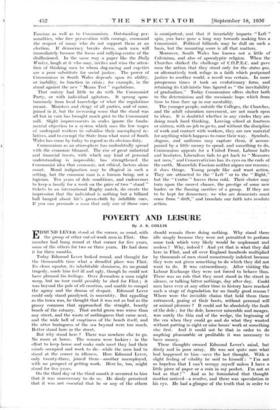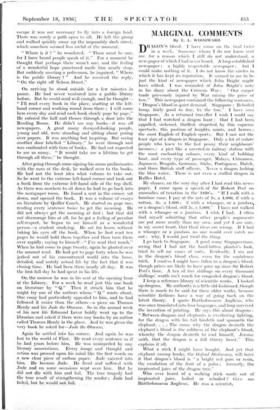POVERTY AND LEISURE
By J. S. COLLIS
EDMUND LEVER stood at the corner, as usual, with the group of other out-of-work men in Flint. One member had hung round at that corner for five years, sonic of the others for two or three years. He had done it for three months.
. Today Edmund Lever looked round, and thought for the thousandth time what a dreadful place was Flint. Its clean squalor, its inhabitable sluminess, its un-grand tragedy, made him feel ill and ugly, though he could not have phrased his feelings. Over Jerusalem a man might weep, but no tear could possibly be shed for Flint ; it was beyond the pale of all emotion, and unable to compel the agony and the drama of despair. Edmund Lever could only stand paralysed, in nonentity. But appalling as the town was, he thought that it was not as bad as the grassy common that approached the straight, beastly beach of the estuary. That awful green was worse than any street, and the waste of nothingness that came next, and the wide hell of emptiness of the beach itself, and the utter boringness of the sea beyond were too much. Better stand here in the street.
But why stand here ? There was nowhere else to go. No room at home. The women were luckier ; in the effort to keep house and make ends meet they had their minds occupied and work to do—while the men had to stand at the corner in idleness. Here Edmund Lever, only twenty-three, joined them—another unemployed, with no prospect of getting work. Here he, too, might stand for five years.
On the third day of the third month it occurred to him that it was unnecessary to do so. He dimly perceived that it was not essential that he or any-of the others should remain there doing nothing. Why stand there idle simply because they were not permitted to perform some task which very likely would be unpleasant and useless ? Why, indeed? And yet that is what they did here in Flint, and all over England hundreds multiplied by thousands of men stood monstrously indolent because they were not given something to do which they did not want to do. It was extraordinary. After visiting the Labour Exchange they were not forced to behave thus. There was no rule that they must stand in the street in silence, or talking bitter nothings, day after day. Could men have ever at any other time in history have reached such a stage of degradation for no finally good reason ? Where were the invisible chains that held them there entranced, gazing at their boots, without personal will or animal pleasure ? It could not be absolutely the fault of the dole ; for the dole, however miserable and meagre, was surely the thin end of the wedge,. the beginning of the era when they could go and do what they wanted without putting in eight or nine hours' work at something else first. And it could not be that in order to do anything pleasurable or profitable it was necessary to have money. . .
These thoughts crossed Edmund Lever's mind, but dimly and in poor array. He was not quite sure what had happened, to him—save the last thought. With a slight feeling of vitality he said to himself : I'm not so hopeless that I can't occupy myself unless I, have a little piece of paper .or a coin in my pocket. I'm not as bad as that ! " And as he formulated that thought another arriveda resolve, and there was speculation in his eye. He had a glimpse of the truth that in order to escape it was not necessary to fly into a foreign land. There was surely a path open to all. He left the group and walked quickly away up- the impossibly drab street, which somehow seemed less awful at the moment.
" Where is it ? " he wondered. " There must be one, for I have heard people speak of it." For a moment he thought that perhaps there wasn't one, and the feeling of a wonderful hope punctured made him nearly stop. But suddenly meeting a policeman, he inquired, " Where is . the public library ? " And he received the reply, " On the right off Nelson Street."
1 On arriving he stood outside. for a few minutes in pause. He had never ventured into a public library before. But he could read well enough, and he thought- " read every book in the place, starting at the left- hand corner and working round from there ; I will come here every day and read each book slowly page by page." He entered the hall and thence through a door into the Reading Room. He didn't see any books—it was all newspapers. A great many decayed-looking people, young and old, were -standing and sitting about poring over papers. It was anything but inspiring. But seeing another door labelled " Library," he went through and was confronted with tiers of books. He had not expected to see so many. " It would take me a lifetime to get through all these," he thought.
. After going through some signing-his-name preliminaries with the man at the desk, he walked over to the books. He had not the least .idea what volume to take out. So he went to the extreme left-hand corner and took out . a book from the extreme left-hand side of the top shelf. As there was nowhere to sit down he had to go back into the newspaper room. He found a seat in the corner, sat .down, and opened the book. It was a volume of essays on literature by Quiller Couch. He started on page one, reading every sentence twice to get the meaning. He did not always get the meaning at first ; but that did not discourage him at all, for he got -a feeling, of peculiar self-respect, he began to see himself as a wonderful person—a student studying. He sat for hours without taking his eyes off the book. . When he had read ten pages- he would hold them together and then turn them over rapidly, saying to himself—" I've read that much." When he had-come to page twenty, again he gloated over the amount read. He had got to page forty when he was jerked out of his concentrated world into the loose, detailed, and untidy actual life by the fact that it was closing time.. He had been there nearly all day. It was the first full day he had spent in his life.
On the morrow he was in his seat at the opening hour of the Library. For a week he read just this one book on literature by " Q." Then it struck him that he might try one of the authors whom " Q " wrote about. One essay had particularly appealed to him, and he had followed it easier than the others—a piece on Thomas Hardy and his Jude the Obscure. So in the second week of his new life -Edmund Lever boldly went • up to the librarian and asked if there were any books by an author called Thomas Hardy in the place. And he was given the very book he asked.forlude the Obscure.
Again he settled into his corner. And again he was lost to the world of Flint. He read every sentence as if he had years before him. He was unimpeded by any literary associations. Every image and thought and action was pressed upon his mind like the first words on a new clear piece of carbon paper. Jude entered into him. He became Jude. He lived and suffered with Jude and on some occasions wept over him. But he did not die with him and fail. The true tragedy had the true result of strengthening the reader Jude had failed, but he would.not.fail.











































 Previous page
Previous page